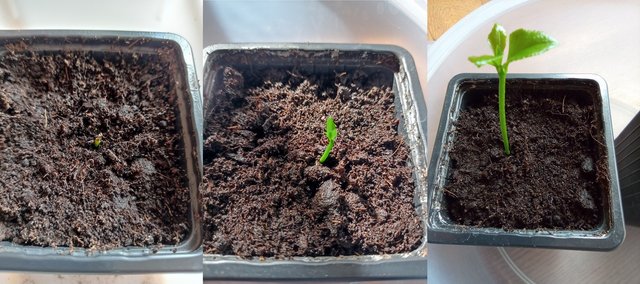AI Help for Gardening
In this article, I'll discuss how AI can help gardening and my experience with it.
First, a quick explanation of the image in this post: these are lemon tree seedlings that I germinated with the help of AI, which advised me to remove the outer seed coat to speed up germination and prevent mold growth by eliminating the risk of pulp fragments remaining stuck. However, this is a delicate operation because you mustn't damage the seed under the rind, and you shouldn't hesitate to plant many seeds.
3 out of 8 seeds sprouted, which I think is a good ratio.
Here, I have three that have germinated. Indeed, they aren't the same at all three stages, but three different ones that develop more or less quickly.
How can AI help us in gardening?
The AI, of course, has botanical knowledge, but so does my florist, and I often chat with him at the market. His advice is valuable, but limited to his plants, which he knows very well.
However, he lacks the experimental, scientific, and multidisciplinary approach that AI can provide.
These disciplines could include biology, microbiology, chemistry, methodology, and many others.
Beyond its extensive knowledge, AI allows for a personalized approach to gardening.
I should point out that I use Microsoft's Copilot version GPT-5, integrated into the Edge browser, and a dedicated Microsoft account, meaning I don't share my other internet browsing with Microsoft.
This is important because the advantage and disadvantage is that the AI remembers all your previous conversations.
The privacy issue is addressed by a dedicated account.
The advantage is huge: there's no need to repeat your planting plans; the AI remembers them, as well as your location and therefore specific climatic conditions.
If you told it that your balcony faced west, it would incorporate this into its future advice by saying, for example, "Since your balcony faces west..."
It's quite confusing, but the AI also analyzes your habits, your needs, and your personality.
For example, if you prefer to plant seeds rather than buy seedlings, it will spontaneously talk about sowing if you mention a plant.
If you have an aphid infestation, it will tell you, even if you don't mention it, that choosing one plant over another will help you fight them.
As for personality, it's quite amusing: the AI recognized that I like the experimental approach and that I don't follow the usual gardening patterns. It therefore spontaneously suggests variations, specifying that this could satisfy my tendency to experiment with new things.
Another advantage of AI in gardening is that it remains very open to your questions and suggestions. If its answers don't satisfy you for any reason (means unavailable, method too complicated, etc.), simply say so and ask for alternative solutions.
For example, I plan to take olive tree cuttings. I asked for the method, and the AI advised me to use a growth hormone to promote root growth.
Since I didn't intend to buy any, it suggested the alternative of a willow leaf infusion or simply aspirin (acetylsalicylic acid).
The AI's concise presentation of the answers is also an advantage; it offers tables with pros and cons or chronological tables for planting with the important steps.
Feel free to share your experiences of AI-assisted gardening in comments.
Cross posted on Hive blog with a French version:
https://ecency.com/hive-140084/@servelle/ai-help-for-gardening-en
(Published through Steemit Dapp https://boylikegirl.club)

Upvoted! Thank you for supporting witness @jswit.